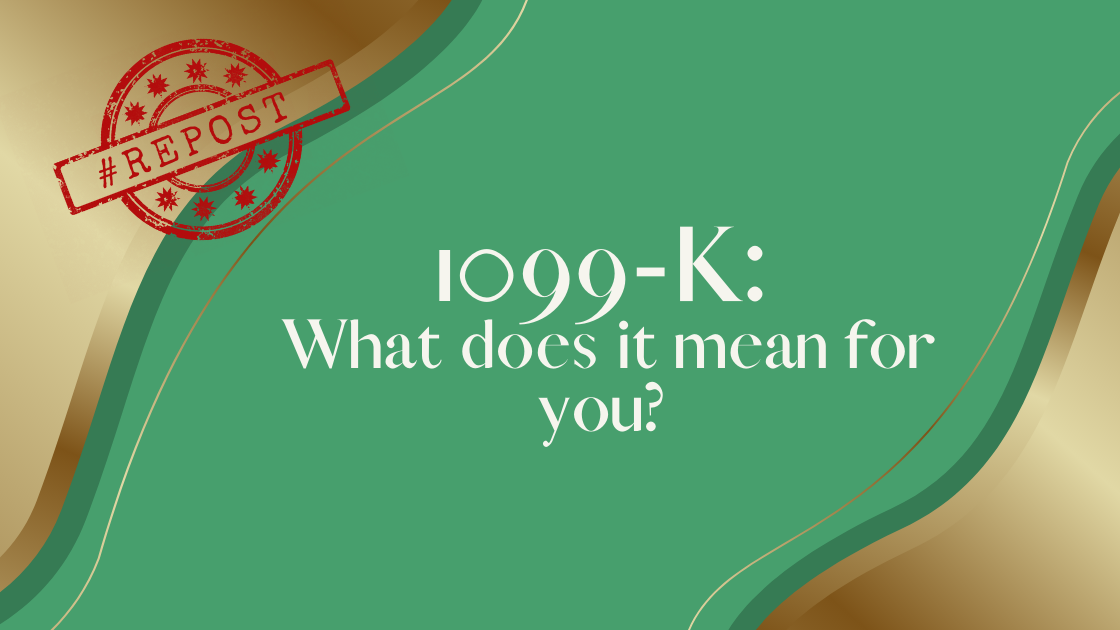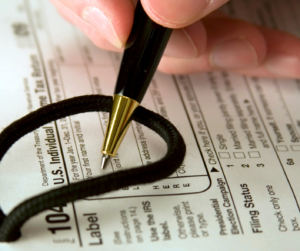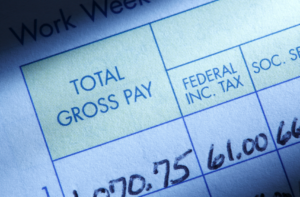#REPOST Congress Closes the Third Party Payment Loophole. Huh?
Since we have been getting so many concerned client asking us about this I have decided to #repost this blog about the 1099-k and what it means for you!
Congress passed the American Rescue Plan Act (ARPA) in March, it made a tiny but extremely significant alteration to how independent contractors report earnings. (trick trick Government). Basically, this new rule made it harder for independent contractors as well as some businesses to hide their earnings from the IRS. This particular bit of legislation deals with their party electronic payments. In the digital era- that sounds so 90’s- it has become commonplace to pay people through third party apps like Paypal, Venmo and Zelle just to name a few.
Before reporting this income and payments fell into a grey area on one really looked at. Welp, now the IRS has! (Um….This Sucks!)
Not to worry the big changes are coming in 2020, due this is what you need to know now.
Third-Party Information Reporting
I swear this is not a Jane Austin novel but, the government knows this universal truth: taxpayers are much less likely to report all their income on their tax returns when the IRS has no way of independently verifying their income. This is why the 1099 exists. With a company’s due diligence, they should be reporting all paid labor of $600 and above.
The IRS has a series of 1099 forms that financial institutions, employers, and businesses use to report various types of payments. These countless 1099s are the IRS’s method of tracking the amounts paid form a payor to a payee throughout the year.
Once these 1099 are reported to the IRS, they can track how much you (the Payee) received throughout the year. Thus, the IRS matches these figures with the amount reported on the recipient’s tax returns to determine whether underreporting has occurred.
You may have noticed you 1099 looked a little different in 2020
The 1099-MISC was replaced by the 1099-NEC. This is the new form used by businesses to report payments to unincorporated independent contractors.
Beginning with the 2020 tax year, you file Form 1099-NEC for paid work when your business pays $600 or more to
- An unincorporated service provider,
- an incorporated attorney, physician or other health care provider
Statistics Prove the Case
Form 1099-MISC and the other 1099 information returns effectively combat underreporting of income.
Individual taxpayers fail to report about 55 percent of income from sources for which there is no information reporting. In contrast, only 5 percent of income listed on a 1099 goes unreported. (Naughty-Naughty). We get it, who wants to pay the tax man more than they have to, am I right?!?
Loophole
Because there is always a loophole, There is a big exception to 1099-NEC (formerly 1099-MISC) reporting. A payor must file a 1099-NEC only when it pays a recipient $600 or more during the year by check, cash, money order, or direct deposit.
Something of note: Third party payers like Zelle, Paypal and Venmo where not included in is form of reporting 1099s.
Hence, the loophole, instead of paying Erica for her IT work with a check, you simply paid here though whatever app she preferred, and the money is never reported. Why? Because there was never a precedent for this.
Since 2011, you have been able to avoid Form 1099-MISC (and now 1099-NEC) if your business pays through a third-party settlement organization (TPSO) such as PayPal or Payable, by credit card, or by debit card.
With this strategy, you push the reporting requirements to the TPSO.
Current law requires that the TPSO file IRS Form 1099-K with the IRS and send it to you when

- Your gross earnings are more than $20,000
OR
- You have more than 200 transactions.
For example: Erica hired for an IT project, and you pay her $30,000 via whatever app she prefers. This app does not give the consultant a 1099-K because this fails the more than 200 transactions in a calendar year test. (Brilliant, loophole for Erica)
In fact, Erica could have 10 clients, each paying $10,000 via the a third party app, and she would not receive a 1099-K.
(Now, Erica is either a genius, or the IRS has not caught on to this.)
Credit Cards Are Different
Credit card companies and banks also must use Form 1099-K to report payments by credit cards or debit cards. There is no “more than $20,000 and more than 200 transactions” threshold for such reporting.
A business that accepts credit cards receives a 1099-K that shows all the monies paid by the credit card company to the business. The 2011 creation of the 1099-K did away with a big chunk of the underground economy whose members avoided paying their fair share of the taxes.
Goodbye, 1099-K Loophole
Starting January 1, 2022, the American Rescue Plan Act kills the two-step “more than $20,000 and more than 200 transactions” threshold for TPSO filing of 1099-K.
It has now been replaced with the single “$600 or more” reporting threshold. Just like the rest of the 1099 Form family.
The Joint Committee on Taxation estimates that it will gain more than $8 billion in new taxes over the next 10 years with this change. (yay IRS, BOO for Us!)
This will affect not just independent contractors but snag millions of taxpayers, including gig workers such as Uber, Lift, Instacart, and Grubhub drivers; even eBay and Etsy sellers. Basically anyone who takes advantage of this loophole (Sorry Erica!)
States That Closed the Loophole
Several states have already closed this reporting loophole on the state level:
- Maryland, Massachusetts, Mississippi, Vermont, and Virginia currently require a 1099-K to be filed with the state tax agency if a TPSO pays a state resident $600 or more during the year.
- Illinois and New Jersey have a $1,000 1099-K threshold (plus, for Illinois, a requirement of at least four transactions).
- Arkansas has a $2,500 threshold.
- Missouri has a $1,200 threshold.

Additional Clarification
Congress also amended the tax code to make clear that third-party network transactions requiring a 1099-K include only transactions for goods and services.
Here is where we as third party app users can breathe a sigh of relief: a 1099-K is not necessary when an individual uses an app to reimburse friends or relatives for expenses or to make charitable contributions.
Nor does the TPSO need to send a 1099-K for payments of royalties or rents. This change is effective March 12, 2021
Now, this may create other creative solutions to this problem, but that is between you and your app!
Still don’t understand the legalize to is all? We can help sort you out! Contact Us







